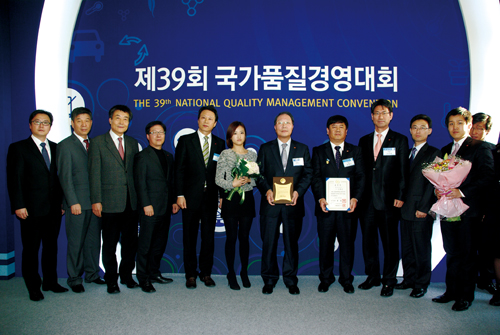Wins the Excellent Quality Competitive Enterprise Prize in the public sector category of the Korea National Quality Award for the 7th consecutive year

KEPCO KPS President Choi Yeu-geun poses with his company officials after he was honored with the Excellent
Quality Competitive Enterprise Prize in the public sector category of the Korea National Quality Award at the 39th
National Quality Management Convention at the KEPCO headquarters in Seoul on Nov. 28.
KEPCO KPS has been honored with the Excellent Quality Competitive Enterprise Prize in the public sector category of the Korea National Quality Award at the 39th National Quality Management Convention at the KEPCO headquarters in Seoul on Nov. 28. KEPCO KPS was awarded the prize for the 15th consecutive year this year. The company was the first Korean public entity to be inducted into the “Hall of Fame” of excellent companies with quality competitiveness last year. KEPCO KPS has become a quality management household brand as the company earned the “Grand Slam” title by chalking up superb management performances through quality management and innovative activities since 1999.
In particular, KEPCO KPS’s receiving the the Excellent Quality Competitive Enterprise Prize honor for the 15th consecutive year is unprecedented in the history of Korea’s quality management awards. Recognition of KEPCO KPS’s service quality and quality management performance from the government attests to the fact that the company has a sufficient competitive edge to maneuver in the global market.
This achievement was owed to KEPCO KPS’s staff’s endless efforts to offer quality maintenance services. KEPCO KPS is now redoubling its efforts to become a global company focusing on customers and markets, communicating and cooperating with interest groups, and being committed to its social responsibility.
In this regard, KEPCO KPS set aside 5 percent of its sales for R&D investments and development of gifted manpower. The company is known for offering quality maintenance services while implementing projects in 20 countries, including the United Arab Emirates.
KEPCO KPS is carrying out the KPS Way TPM (total productive maintenance), a five-stage quality management program. The program has paid off: making a feat of no stoppages stemming from a breakdown for the ninth consecutive year and reducing the period of planned preventive maintenance projects. The reduced period for maintaining 105 units during 2012 amounted to 290 days, having the effect of the output of a 351MW-class power plant.
The company is conducting its “Be the Master” campaign. For example, KEPCO KPS has simplified 4,636 kinds of thermal power plant maintenance processes into 100 kinds of flow chart-type ones, resulting in saving 5.4 billion won in manpower costs annually.
KEPCO KPS is a company specialized in reliable, high-quality maintenance of power plant, transmission, substation, and industrial facilities. First established for the efficient maintenance of electric power facilities in Korea, which are crucial to economic development, KEPCO KPS has brought greater convenience to the public by developing technology and nurturing experts in this field for the last three decades. Furthermore, the company has exerted enormous efforts to raise Korea’s maintenance technology to among the world’s best.
Thanks to years of hard work, KEPCO KPS now holds maintenance technologies for hydro, thermal, and nuclear power plants that are on par with those of advanced countries. Korea’s high utilization of power facilities ranks with those of advanced countries such as the United States and Japan. KEPCO KPS is among the world’s top when it comes to the diversity of its technology.
KEPCO KPS President Choi, in his inaugural speech at the KEPCO KPS head office in Bundang, Seongnam City, Gyeonggi-do, on Nov. 8, stressed solidifying its capabilities in a way that it cannot be swayed by any environmental changes, despite the expected raft of hardships and challenges including the expanded competition of the power maintenance market.
He announced his top four management tenets – management innovation through the reinvention of a management constitution; building a creative corporate culture through sharing and communications; creating synergetic effects by meeting customers’ needs; and strengthening global capabilities to rise to a world-class company.
